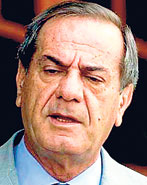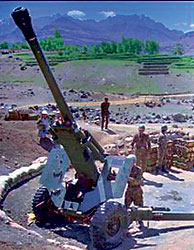When Prime Minister Manmohan Singh claims to be cleansing the administration, he should not be seen as a party to the withdrawal of the case against Ottavio Quattrocchi who received the commission of Rs.640 million in the purchase of the Bofors guns.
The CBI's u-turn is visible although the hand behind it is not. Nonetheless, it is an open secret that he was a friend of Sonia Gandhi's family in India and Italy.
The Prime Minister's defence that they acted on legal advice from the Attorney General, Solicitor General and the Law Minister does not hold water when all three are the government appointees. If the Prime Minister is so confident, let him appoint a panel of retired chief justices of India to go into the case.
It is true that the Malaysian courts cleared Quattrocchi when India asked for his extradition during his visit to that country. The failure to get his conviction abroad does not mean that there is no case against him. If he had been innocent, he would not have run away from justice in India. That his Italian connection has given him an advantage goes without saying. But it is regrettable that the government has gone to the extent of having the same senior counsel who had defended Win Chaddha, another accused who is no more, to defend Quattrocchi.
The question is not whether the case should be withdrawn or not but whether the government's failure to bring Quattrocchi to justice can be the basis to exonerate him. Let the case go on for another 20 years or remain pending but let not anyone point the finger at India for having compromised on the issue of corruption publicly and blatantly.
I am reminded of an incident when Mahatma Gandhi was leading the Congress in its fight for independence. Ishwar Singh Keveshwar, connected with the Forward Block, was nominated to the party's Working Committee. Gandhiji put a question mark against the name when he saw the list of members.
Ishwar Singh Keveshwar ran to Gandhi to know why he had done so. Gandhiji pulled out a postcard from his shelf. It was a complaint against Keveshwar for not having cleared a sum of Rs. 500 which he had borrowed. Keveshwar said: Bapu, the payment was time barred. Gandhiji said: The question was not legal but moral. In the same way, withdrawing the case against Quattrocchi and writing off the commission of Rs. 640 million raises moral issues, not legal.
In fact, those who have worked feverishly to bury the case, from former Law Minister H. R Bhardwaj to present Law Minister Veerappa Moily with the blessings from 10 Janpath, have done great disservice to Manmohan Singh who has got a muddy spot on his white clothes. That he was helpless is a sad commentary on today's scenario.
 |
| Ottavio Quattrocchi |
Yet the harm done to the cause of integrity is deeper than anything else.
I feel sorry that in the Bofors case, Manmohan Singh has not been able to enforce the same strict standard as he has set for himself in life. The government's withdrawal of the case without punishing those who pocketed commission is, indeed, disconcerting.
But what worries me more is that that posterity will record that the withdrawal of the case took place during the regime of Manmohan Singh. I wish the Congress had waited for some more time, at least till Manmohan Singh's rule was over. Was the exoneration of Quattrocchi so important that even the reputation of Manmohan Singh had to be compromised?
Quattrocchi was a familiar figure during the emergency and the Rajiv Gandhi's regime. He had every rule and every regulation of the land bypassed to have his way through. I had written in my book, The Judgment, on the advantage his firm got during the emergency. He came to my office and threatened to sue me. Subsequently, he begged me to delete his name from subsequent editions. His name stayed but he never took me to the court.
The government's application on the withdrawal is full of contradictions. It says that no appeals have been preferred by the CBI against two High Court judgments (that cleared the accused). Facts say otherwise that the CBI decided to file challenges in the Supreme Court but was not permitted to do so. It is an open secret that before the Manmohan Singh government came to power, the agency sought legal opinion for challenging the judgment. However, two months after the Manmohan Singh government had taken over both Law Secretary R.L. Meena and the Attorney General said in a legal opinion that the verdict was not a "fit case" to challenge.
There was no prohibition of employment of Indian or foreign agents, says the CBI, in its application. But this is contrary to its earlier decision. On May 3, 1983, the then defence secretary met all contenders of the Howitzer contract and informed that "the present government did not approve of the appointment of agents acting for foreign suppliers." The defence secretary, according to the CBI documents, also told Martin Ardbo (chief of Bofors) that the government of India would disqualify a firm if it was found that an Indian firm had appointed an agent.
On March 6, 1986, days before the contract was signed, the Bofors president said the Swedish firm did not "have any representative or agent especially employed in India for this project." However, when the scam broke and the Swedish National Audit Bureau confirmed that "winding-up costs" had indeed been paid, the then Minister of State for Defence, Arun Singh, threatened to cancel the contract. But it turned out to be a mere threat.
The CBI's course of action only confirms the general opinion that the agency should not be under the government. At present, it is a political tool in the hands of the ruling party. Cases of corruption against Mayawati and Lalu Prasad Yadav become active when the party in power is angry with them and they become dormant when their support is needed. Both of them should have faced the court punishment long ago. But the politics at the centre has saved them. The CBI has remained an instrument as is evident in the case of Quattrocchi.
The scandal: A brief history
The Bofors scandal was a major corruption scandal in India in the 1980s; the then Prime Minister Rajiv Gandhi and several others were accused of receiving kickbacks from Bofors AB for winning a bid to supply India's 155 mm field howitzer.
 |
| Indian soldiers using Bofors guns |
The Rs. 640 million corruption case was far worse than any that India had seen before, and led to the defeat of Gandhi's Congress party in the November 1989 general elections.
The case came to light during Vishwanath Pratap Singh's tenure as defense minister, and was revealed through investigative journalism by Chitra Subramaniam and N. Ram of the newspapers the Indian Express and The Hindu.
The middleman associated with the scandal was Ottavio Quattrocchi, an Italian businessman who represented the petrochemicals firm Snamprogetti.
Quattrocchi was reportedly close to the family of Prime Minister Rajiv Gandhi and emerged as a powerful broker in the 1980s between big businesses and the Indian government.
While the case was being investigated, Rajiv Gandhi was assassinated on May 21, 1991 by an LTTE suicide bomber.
In 1997, the Swiss banks released some 500 documents after years and the Central Bureau of Investigation (CBI) filed a case against Quattrocchi, Win Chadha, also naming Rajiv Gandhi, the defence secretary S. K. Bhatnagar and a number of others.
On February 5, 2004 the Delhi High Court quashed the charges of bribery against Rajiv Gandhi and others, but the charges of cheating, causing wrongful loss to the Government, etc were not withdrawn.
(The writer is a veteran Indian journalist and diplomat. He was also one time Rajya Sabaha member)
|



